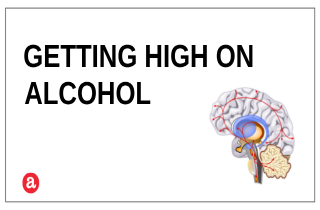Alcohol-related problems caused by drinking too much, too fast, or too often are among the most significant public health issues in the world. But how does alcohol work? Does it cause euphoric effects? We review here and take look at the ways to cope with possible alcohol problems, including becoming physically addicted to alcohol. Then, we welcome your questions about regular drinking or how to abstain from alcohol at the end of the article.
What’s in alcohol?
Alcoholic beverages are consumed around the world, among people of all nations and religions. But where does the term “alcohol” comes from and what is the essential ingredient of all the alcoholic beverages? The term alcohol is derived from root word in Arabic ??? (al-kuhl, “al”- the, “kohl”- a powder used as an eyeliner, antiseptic and cosmetic). The etymology is based on the fact that alcohol was primarily used for medicine and in making perfumes and makeup.
Nowadays, “alcohol” usually refers to ethanol, or a beverage based on ethanol. Ethanol is the addictive force behind any alcoholic drink. An alcoholic beverage is a drink that typically contains 3%–60% ethanol, commonly known as alcohol. Alcoholic beverages are divided into three classes: beers, wines, and spirits (distilled beverages). They are legally consumed in most countries around the world.
How does alcohol work?
Alcohol is a central nervous system depressant that is rapidly absorbed from the stomach and small intestine into the bloodstream. Then it crosses the blood-brain barrier and interacts with neurotransmitters in the central nervous system. There, the alcohol stimulates the delivery of “happiness chemicals” – serotonin and dopamine – to the brain and creates feelings of euphoria.
Getting high on alcohol
There is no doubt that you can get high on alcohol, which can lower your inhibitions and barriers only 30 minutes after consumption. In addition to feeling good, alcohol can make you feel dizzy for hours after it has been consumated. However, if you notice some of the following symptoms, it means that the alcohol consumption has gone too far:
- arrhythmia (variations in heart rate)
- hardened facial muscles
- heavy extremities
- slow and incoherent speech
- tachycardia (fast heart beat)
- temporarily loss of memory (“blackouts”)
- unstable blood pressure
Am I addicted to alcohol?
As with most of the addictions, an alcohol addiction can start out quite innocently, during adolescent years, when teenagers decide to try out a drink or two, out of simple curiosity. Binge drinking is not uncommon among students. Nearly one quarter of people age 18 and older report that they consumed five or more alcoholic drinks on the same occasion on at least one day in the past month.
But to define problems with alcohol, excessive alcohol use includes:
- Any drinking by pregnant women or those younger than 21.
- Binge drinking (defined as consuming 4 or more alcoholic beverages per occasion for women or 5 or more drinks per occasion for men).
- Heavy drinking (defined as consuming 8 or more alcoholic beverages per week for women or 15 or more alcoholic beverages per week for men).
Cutting back on or quitting alcohol completely can have significant health benefits. People who reduce their drinking decrease their risks for injuries, depression, stroke, sexually transmitted diseases, several types of cancers and liver and heart disease. However, there may be situations when treatment for alcohol addiction is required.
Help for alcohol abuse
Effective treatments exist to help people quit drinking. However, only 15% of alcoholics seek professional help (usually when the addiction goes too far).
The most successful recovery methods are those that address the body AND the mind to change drinking behaviors.
Alcohol abuse treatment generally consists of three stages: Detoxification (detox), rehabilitation and maintenance of sobriety. At the moment, there are several medicines which are approved by the U.S. Food and Drug Administration to help people with alcohol problems stop or reduce their drinking and prevent relapse. These medications – naltrexone, acamprosate, and disulfiram – are non-addictive and can be used alone or in combination with behavioral treatment.
Alcohol high questions
Do you still have questions about the euphoric alcohol effects and its consequences? Feel free to ask anything alcohol-related in the comments section below, and we’ll try to provide you reliable and up-to-date information.









Related Posts